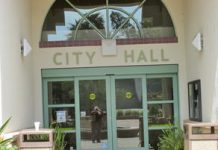By Ted Apodaca
With many businesses shuttered, the economic impact on small businesses could be devastating.
Small businesses are the heart of most economies, Avalon in particular, relies on many of them to provide the services needed by residents and visitors.
With the COVID-19 shutdown bringing all that to a halt, programs are being funded to help small businesses survive. Local representatives, U.S. Congressman Alan Lowenthal and State Assemblyman Patrick O’Donnell, were part of a teleconference on April 10, with State Senator Lena Gonzalez to discuss the help available.
“We’re at a time when everybody’s attention is focused on the Coronavirus,” Lowenthal said.
One of the points Lowenthal discussed was a $375 billion Emergency Disaster Grant fund, that was set up to offer bridge loans and grants to small businesses.
This includes a payroll protection program that businesses can obtain to pay employees and could potentially be forgiven.
“If the majority of the loan, which is 75% or more, is used to keep current employees on the payroll for the next eight weeks,” Lowenthal said.
However, Lowenthal admitted that the first batch of available money has been gobbled up quickly by applicants. He said Congress and the US Small Business Administration would need to look for more banks to fund these loans.
Visiting the sba.gov website shows that many of the loan options are currently on hold and unable to take more applications at the is time.
Unemployment has skyrocketed and applications for unemployment insurance is in high demand. Again, there is a bottleneck of applicants, but Lowenthal said an additional $260 billion in funding is going to states for unemployment. And the parameters are expanding for those who qualify.
“That unemployment insurance is going to cover many more people than historically had been done before,” Lowenthal said.
O’Donnell was asked to offer some updates on schools during the call and one of the points he made was regarding the transition for graduating high school seniors. If the shutdown creates issues with seniors missing things for moving on to college, there could be accommodations within the UC and CSU systems to provide ways for them to still move on and make up those gaps created by the shutdown.
Meanwhile, those who are just waiting for life to return to some sense of normalcy, are finding ways to stay productive. Islander, Judy Grear, shared some of the things she has gotten done.
“Finished cleaning out all my closets, redoing all my files, scrubbing anything that didn’t move, reading and forwarding all the jokes in the world, I looked around for something I could do. Pulling weeds is within my physical (and mental) capability, so I started on my land in the alley. That didn’t seem so hard, so I kept on going. No big deal. Felt good. Nobody in the alley, so didn’t wear a mask unless someone came near. It’s a small thing. It’s outdoors, not near anyone, and things look so much better … Many people on the island do big things and I want them to know I am so grateful,” Grear wrote.
Eventually, we will get through this. The world may never be the same, but we will find a new normal. What are you doing to stay busy? What are you doing to stay entertained? What are you doing to stay sane? Share with us. Send your photos and stories to editor@thecatalinaislander.com.
Ted Apodaca is the editor of the Catalina Islander. He can be reached at editor@thecatalinaislander.com, or at 562-317-1100.











